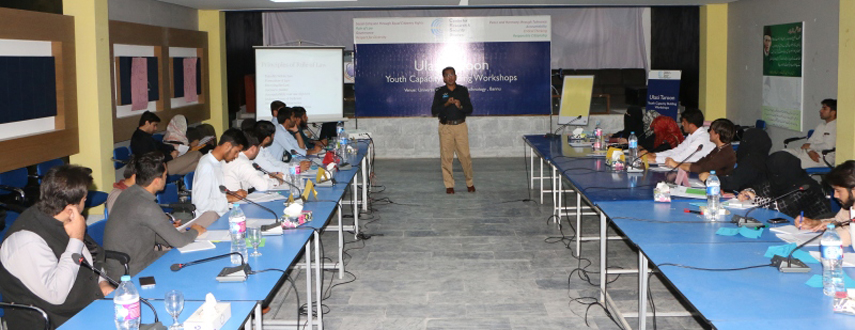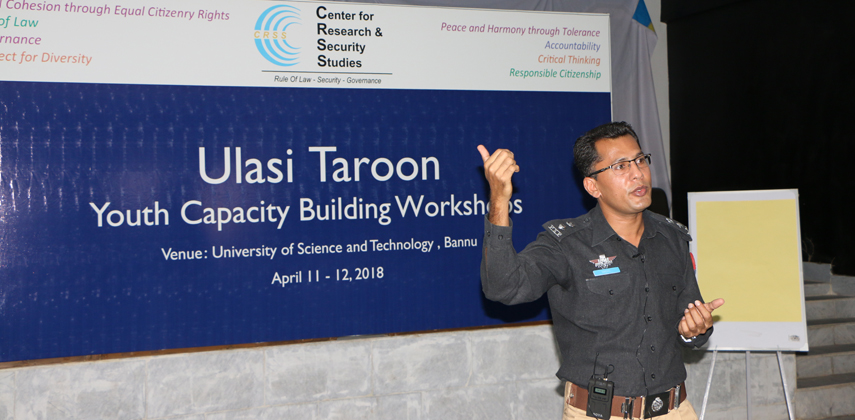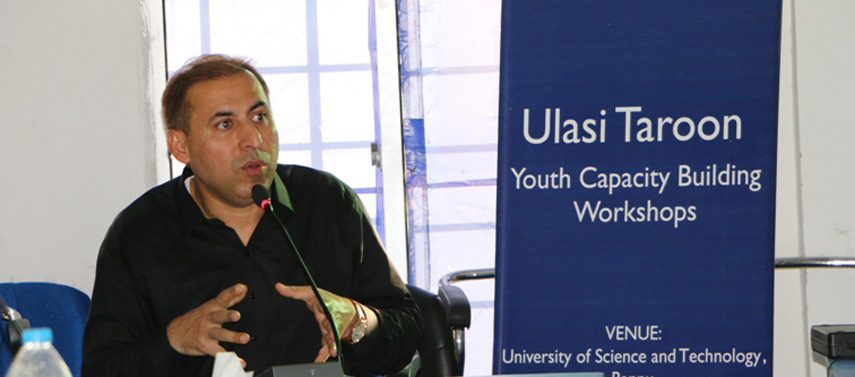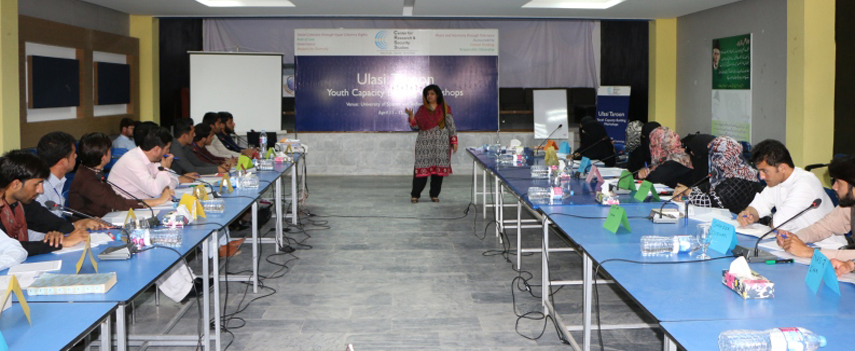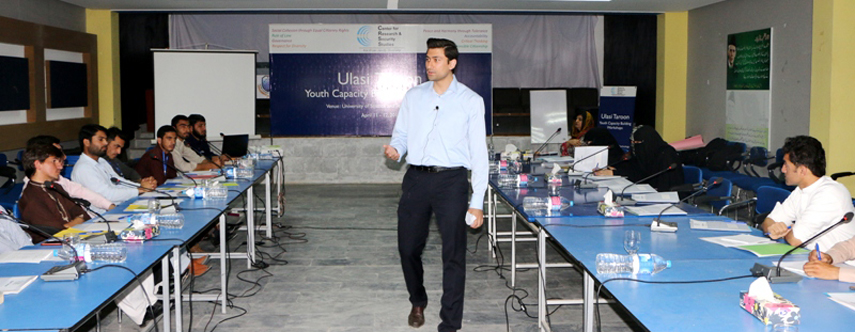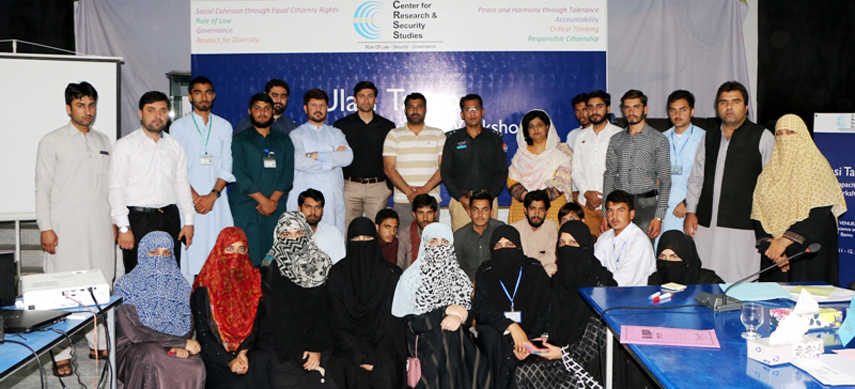Not king is law but law is king. Everyone is subject to law. Human rights education can prevent human rights abuses. Mutual respect, understanding and equal opportunities are critical for inclusive democracy and good governance. Accountability and rule of law require strict compliance with the core constitutional ideals of peace and cohesion.
There were the notions expressed by the speakers – including Prof. Dr. Engr. Syed Abid Ali Shah, Vice Chancellor, University of Science and Technology, Bannu; and Mr. Sadiq Baloch, District Police Officer (DPO), Bannu – during the fourth round of Ulasi Taroon, Youth Capacity Building Workshops organized by the Center for Research and Security Studies (CRSS) at University of Science and Technology, Bannu from April 11-12, 2018.
“Not king is law but law is king”, Mr. Sadiq Baloch, District Police Officer (DPO), Bannu introduced the concept and history of rule of law to the participating youth leaders in the workshop. He said that rule of law means all people and institutions are subject and accountable to law that is fairly applied and enforced. Discussing the fundamental principles of rule of law, he said that rule of law demands equal application of law on everyone and considers everyone equal before law. Propagating knowledge and information about laws enshrined in the constitution – which are available to the citizens – is critical to ensure rule of law in the society, besides accessible justice. The accountability over the use of power, independence of judiciary, presumption of innocence – until conviction – and ensuring rights of the accused and victims are some of the fundamental principles critical to uphold rule of law in the society. Where there is rule of law, everyone resorts to the limits of their respective roles including government and enforcing agencies. It improves public order and security, protects fundamental rights, promotes positive changes in socio-economic development, ensures political stability and to prevent the incidents of mob justice witnessed several times in Pakistan. Ineducation is the biggest hurdle to uphold rule of law and sanctity of constitution. The most effective strategy to prevent human rights abuses is human rights education. The people aware of their rights can easily opt for and utilize the redressal mechanisms available. Human rights education can enable citizens to express their issues and speak for themselves. It can help citizens resolve conflicts in their social and professional spheres.
The way forward for rule of law in Pakistan is amendments in the existing laws for effective and indiscriminate application of rule of law besides introduction of new laws. The way forward also lies in capacity building of institutions implementing laws, socio-economic development and political stability. He called for independent prosecution for rule of law.
Prof. Dr. Engr. Syed Abid Ali Shah, Vice Chancellor, University of Science and Technology, Bannu said that the quality of democracy and governance in the country have a direct effect on the quality of life of citizens. Inclusive democracy is about respecting and understanding each other’s opinions which are critical for inclusive decision making. Good governance and inclusive democracy mean equal opportunities for all citizens regardless of their socio-economic, political or religious backgrounds. The accountability and rule of law require strict compliance with the democratic values of peace and cohesion. The dialogue anchored in the core constitutional ideals of social cohesion is absolutely essential for peaceful conflict resolution. The youths are ambassadors of peace and have a huge potential in playing an effective role in promoting peace, respect, harmony and a positive image of the country.
Ms. Shagufta Khalique, Educationist said that the efforts to eliminate gender discrimination must begin in the home. The best way to end discrimination against women and girls is to prevent it from happening in the first place by ameliorating its root causes.
Speaking on the fundamental human rights available to the citizens, she said that human rights are all those entitlements of the humans that they get with birth. We are all born with basic human rights; born free and equal in dignity and rights. And Universal Declaration of Human Rights (UDHR) clearly define these entitlements. She said that respecting differences and celebrating diversity are prerequisites for a socially cohesive society.
Mr. Malik Mustafa, Team Leader/ Manager Programs, CRSS said that the deviation from constitution, and giving up on rule of law not only lead to the conflict and fragility but also destroy the social fabric of the society. As future leaders, the youth should be considerate of the criticality of compliance with the core constitutional values as a recipe for social peace and harmony in the society. There is a huge onus on youth to promote ideals of peace enshrined in the constitution.
Ulasi Taroon is a counter radicalization initiative of CRSS that aims to address the radicalization challenges, extremist ideologies and foster social cohesion through a discourse anchored in the core constitutional values which are fundamentally essential prerequisites for social peace and harmony. The endeavor aims to cultivate and sensitize the youth – in the universities across KP and FATA – in the core values in the Pakistani constitution and our social contract. It’s an attempt to highlight the criticality of abiding by these ideals – such as adherence to rule of law, primacy and sanctity of constitution, equal citizenry, responsible citizenship, respect for fundamental human rights, tolerance for diversity and different opinions, inclusive democracy and good governance – as a measure of fostering social cohesion and peaceful co-existence.

